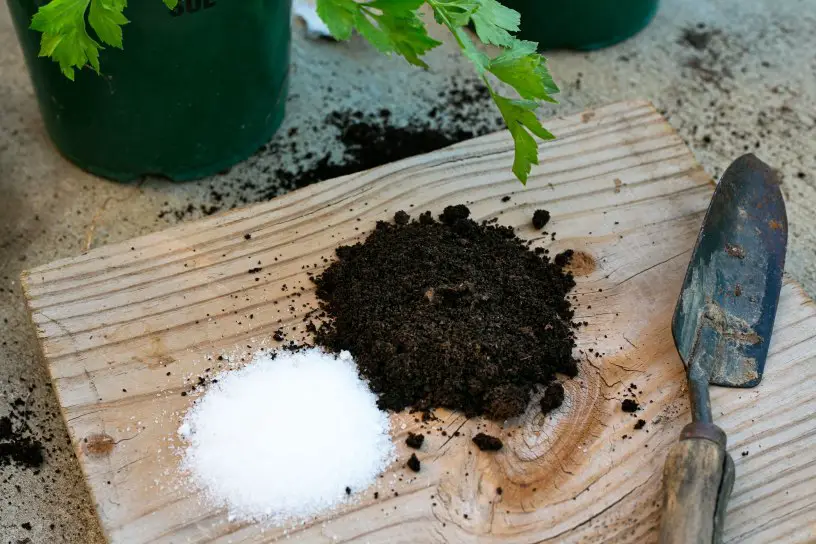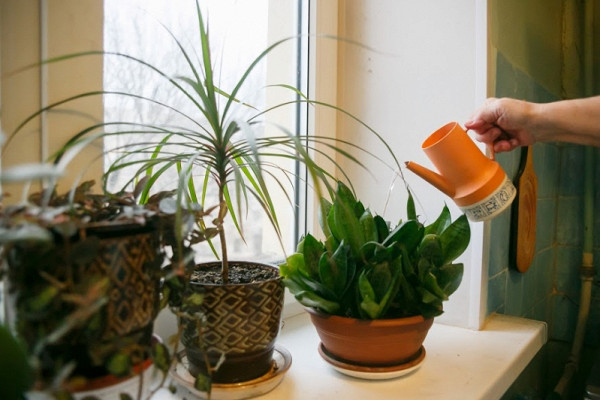In the cold season, not only people but also plants have a lack of vitamins and other nutrients. All this is due primarily to the lack of sunlight and fertilizing indoor plants can reduce this deficiency. In fact, helping houseplants is very simple just use the products that each housewife has in the kitchen. We will talk about fertilizing indoor plants in winter.

Fertilizing Indoor Plants In Winter
Here we have answered about all homemade liquid fertilizer for indoor plants and organic ferlizers for fertilizing indoor plants in winter at home.
Here is list of homemade plant food for water plants:
- Coffee grounds
- Tea brewing
- Sugar
- Beer
- Onion peel
- Eggshell
- Hydrogen peroxide
Are used coffee grounds good for indoor plants?
The waste from the preparation of ground coffee is sure to be left behind every morning in every family. But few thought that they are an excellent source of nitrogen, which helps to assimilate magnesium and potassium necessary for flowers from the soil. There are several ways to use coffee grounds.
· The first is to spread it in a thin layer on the surface of the earth in a pot. So nutrients will be absorbed with each watering.
· The second way is to water the plants with two teaspoons of grounds diluted in a glass of water.
Recommended for you how often to water indoor plants in winter?
Are tea bags good for plants?
Tea brew contains perhaps the largest amount of trace elements useful for indoor plants. It contains potassium to promote growth and flowering, magnesium to enhance photosynthesis, and calcium and manganese to help form a healthy root system. The used tea leaves are most often added to the soil and give useful elements to the plants during watering. At the same time, it is not recommended to use teas with various additives, as well as watering every day.

Is sugar water good for plants?
The glucose found in sugar allows the plants to create the necessary trace elements themselves. For watering in winter, it is recommended to dilute a teaspoon of sugar in a liter of water. You need to feed the plants in this way no more than 1 time in 2 weeks. More frequent watering can lead to mold growth. Sugar top dressing is best for roses and palm trees.
Is beer good for houseplants?
Live beer is a valuable source of vitamins and minerals for plants. It helps them develop better and also increases their resistance to various diseases. Beer is diluted with water in a ratio of 1:10. Plants can be watered with this solution, or smooth leaves can be wiped. Most of all, the beer infusion will appeal to roses, palm trees and money trees. It should be noted that in conditions of high humidity, mold may appear in the pot after beer dressing. In this case, watering must be stopped, and the plant must be transplanted.
How do you use onion peels as fertilizer?
Onion husks are also very good for feeding indoor flowers in winter. It contains vitamins, carotene and phytoncides that increase the immunity of the plant and protect it from harmful microorganisms. To prepare top dressing, a small amount of husk is boiled in 1.5 liters of water for 5 minutes. Cold broth can be sprayed on leaves and soil. It should be noted that a new solution must be prepared before each use.
Are eggshells good fertilizer for plants?
Egg shells are a valuable source of calcium, zinc, selenium, iron, phosphorus, and other trace elements. There are several ways to use it to feed indoor plants in winter. The shredded shells can be placed on the bottom of the pot when transplanting. The second method is to prepare a solution from highly crushed eggshells and warm water, which settles for a week. You can use this infusion once a month. It should be noted that it is not advisable to use the mixture to feed flowering plants.
is hydrogen peroxide good for plants
Due to its properties, hydrogen peroxide is an excellent disinfectant for indoor flowers. To prevent the appearance of mold and harmful microorganisms, 20 ml of hydrogen peroxide is diluted in a liter of water. In winter, plants can be treated with this solution once a week.
Every flower lover needs to remember that indoor plants require regular maintenance and fertilizing indoor plants in winter is important. Getting enough vitamins and minerals, they will not only be able to winter well, but will also delight you with lush flowering and healthy green leaves.